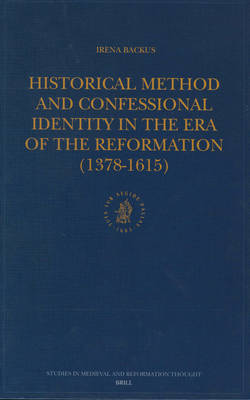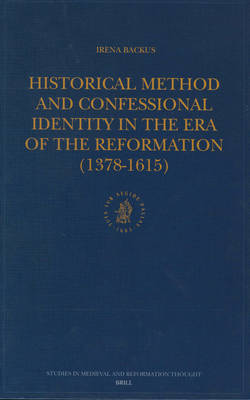
- Afhalen na 1 uur in een winkel met voorraad
- Gratis thuislevering in België vanaf € 30
- Ruim aanbod met 7 miljoen producten
- Afhalen na 1 uur in een winkel met voorraad
- Gratis thuislevering in België vanaf € 30
- Ruim aanbod met 7 miljoen producten
Zoeken
Historical Method and Confessional Identity in the Era of the Reformation (1378-1615)
Irena Backus
€ 236,95
+ 473 punten
Omschrijving
This volume deals with the basic problem of how theologians of all confessions handled ancient, mainly Christian, history in the Reformation era. The author argues that far from being a mere tool of religious controversy, history was used throughout the 16th century to express profound religious and theological convictions and that historians and theologians of different confessions sought to define their religious identity by recourse to a particular historical method. By carefully comparing the types of historical documents produced by Calvinist, Lutheran and Roman Catholic circles, she throws a new light on patristic editions and manuals, the Centuries of Magdeburg, the Ecclesiastical Annals of Caesar Baronius and various collections of New Testament Apocrypha. Much of this material is examined here for the first time. The book substantially revises existing preconceptions about Reformation historiography and view of the past.
Specificaties
Betrokkenen
- Auteur(s):
- Uitgeverij:
Inhoud
- Aantal bladzijden:
- 432
- Taal:
- Engels
- Reeks:
- Reeksnummer:
- nr. 94
Eigenschappen
- Productcode (EAN):
- 9789004129283
- Verschijningsdatum:
- 25/02/2003
- Uitvoering:
- Hardcover
- Formaat:
- Genaaid
- Afmetingen:
- 155 mm x 235 mm
- Gewicht:
- 788 g

Alleen bij Standaard Boekhandel
+ 473 punten op je klantenkaart van Standaard Boekhandel
Beoordelingen
We publiceren alleen reviews die voldoen aan de voorwaarden voor reviews. Bekijk onze voorwaarden voor reviews.











